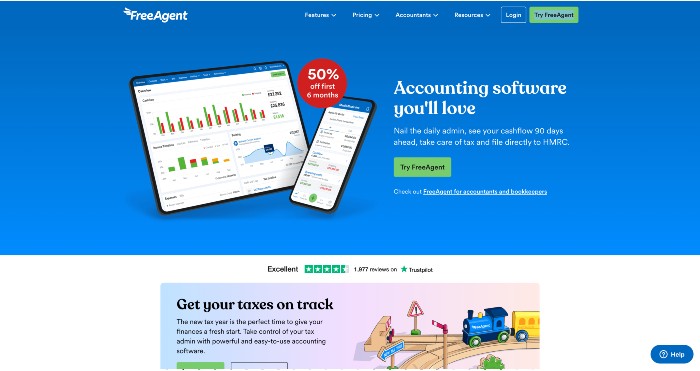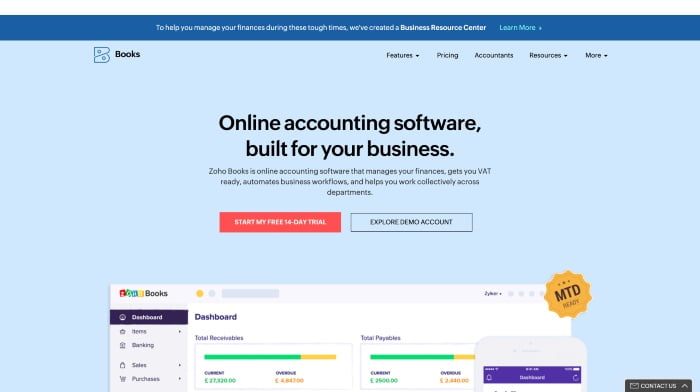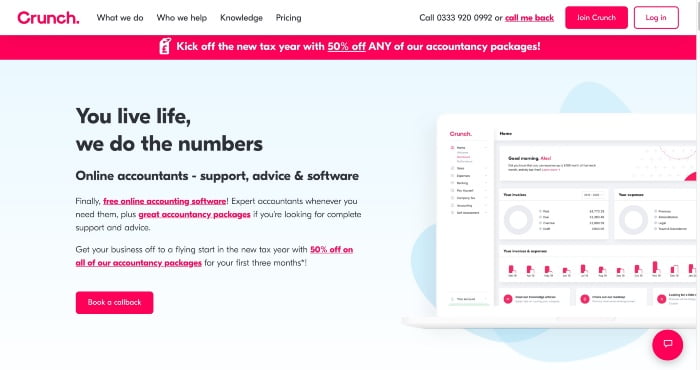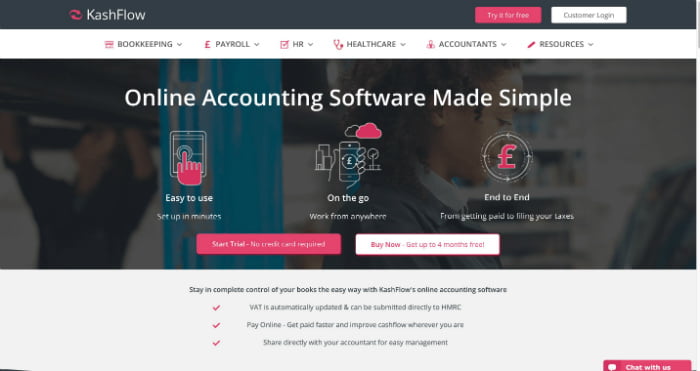In this guide, you’ll discover why you need this software, what accounts you need to keep and our top picks for the best self-employed accounting software for businesses in the UK.
We’ve been self-employed since 2009 and have collected lots of experience in using different self-employed accounting software in that time.
Our reviews are all based on our own personal experiences (where possible) of what helps and what hinders you as a sole trader.
Best accounting software for self-employed – top 3 picks
We’ve recently reviewed our top performing programs, but dive in to discover the good, the bad and if they’re worth it for self-employed businesses like yourself.
| Accounting Software | Cheapest Package | Ease Of Use | Our Rating | Review | Official Site |
|---|---|---|---|---|---|
 | £19/mo | Excellent | 9.4 | Read Review | Visit Website |
 | FREE | Outstanding | 9.3 | Read Review | Visit Website |
 | £12/mo | Excellent | 9.3 | Read Review | Visit Website |
Which Accounting Software Is Right For You?
Answer 5 multiple choice questions to get a personal recommendation:
EXCLUSIVE OFFERS – Save On Your Accountancy Costs
What is self-employed accounting software?
If you’re self employed (i.e. you work for yourself), you’ll need to make sure you’re keeping records of all of your income and expenditure in order to submit accurate tax returns.
Self-employed accounting software helps you do this by providing an online platform to record and store all your digital paperwork.
You’ll be able to explain transactions and use them to generate tax returns such as your annual self-assessment. The best software even lets you submit your returns directly to HMRC.
Why should you use it?
The biggest reason to use self-employed accounting software is that it saves you time and is much easier to keep track of things than any other method.
The other plus point is that if you usually rely on an accountant to submit your returns, you’ll at least make their job quicker and easier. This usually results in lower accountancy fees. Some may even find they can forgo the use of an accountant altogether.
Why Trust Our Online Accountant Reviews?
The owner of Business4Beginners, Paul, been self-employed since 2009 and has operated many businesses in that time.
From being a sole trader to running multiple limited companies at the same time, Paul is vastly experienced in working for himself.
The rest of the Business4Beginners team also have experience of being self-employed and, naturally, that means they’ve used lots of different accounting software too.
Companies cannot pay to be listed on the site, we only review software that we feel is likely to represent good value to self-employed people like ourselves.
Therefore, we offer a place you can get honest and fair assessments of all the top self-employed accounting software.
How Our Ratings Work
In many cases, we have used the accounting software we’re reviewing ourselves for our own self-employed accounts.
In some cases, where we haven’t directly used it, we have at least tested a demo account to check out all the main features and ensure they work well for the majority of people likely to need them.
When neither of these things are possible, we talk to real people with real experience of the software in question. This helps us understand how to rate the tool on the following principles:
- Ease Of Use = How quickly we think most people will get to grips with the platform
- Value For Money = Whether the overall cost justifies the quality and number of features included
- Customer Support = How easily you can contact someone if you need help (and how helpful they are!)
- Features = How good the features are (focused on quality, not quantity)
For each of these four things, we score the platform out of 10. These scores are then added together and averages out to create an overall score.
The overall scores are used to help rank the accounting software as per the table above.
Using accounting software to avoid fines
Accounting has to be one of the most hated and feared parts of any business. But sadly, there’s no escaping it. It’s completely essential that your accounts are up to date, accurate and submitted on time.
If you don’t, your business could face dire consequences. In fact, you can be fined £100 if your tax return is late. The later it is, the more you’ll pay. And of course, you’ll also be charged interest on those late payments.
It’s a mess you don’t want to get yourself into. Which is where the best self-empoyed accounting software comes in to help out...
#1 – FreeAgent (Our Rating = 9.4)
Full disclosure, FreeAgent is the software that we use here at Business4Beginners. But there is a reason for that.
It’s simple to use and one of the easiest software out there to get to grips with – particularly for anyone that’s self-employed with no previous experience. That’s why it features so high in our best self-employed accounting software list.
It’s got some great features that help with:
- Estimates and invoices
- Expenses, with the ability for you to store photos of your receipts
- Time tracking, allowing you more accurate ways to invoice for your work
- Self-assessment tax returns
- VAT or any corporation tax
It’s got more than enough features for most self-employed businesses. You can find out more in our full FreeAgent review.
FreeAgent aren’t the cheapest option on the market with prices starting from £19 a month. But if you use our FreeAgent referral code, you can save 10% on you subscription for life. Now, that price is much better.
#2 – ANNA Business Tools (Our Rating = 9.3)
As one of the simplest accounting tools around, there’s a lot to like about ANNA Business Tools if you’re self-employed.
You still get all the key features you need but they are all simplified to only give you want you need – without any confusing extras.
There’s a free plan available that includes:
- Branded invoices and payment tracking
- Bank feeds that automatically explain transactions for you
- Payroll for one director or employee to comply with PAYE
- Notifications of upcoming deadlines
So, for most self-employed people, the free plan will be more than enough. However, there are a couple of paid plans available if you need some more power to calculate VAT returns or you want to submit other tax returns such as Corporation Tax.
You can find out more in our full ANNA Business Tools review.
#3 – Quickbooks (Our Rating = 9.3)
Quickbooks is one of the best all-round accounting software systems out there.
And luckily for you, Quickbooks was designed with small businesses in mind. So if you’re self-employed or a sole trader, this platform has all the features you need to do your accounting.
It allows you to generate and track invoices, organise and keep a record of all your cash flow and expenses. If you connect your bank account, it will automatically pull your transactions from there too, limiting the amount of manual labour you actually have to do.
Even better, Quickbooks is able able to automatically generate your tax returns. Now, that’s a load of your mind if you’re self-employed.
It’s also very cost-effective, with packages starting from just £12 a month. But you can try it for free with their 30-day trial. For more information, see our detailed Quickbooks review.
#4 – FreshBooks (Our Rating = 9.2)
As a platform, FreshBooks was designed specifically with small businesses in mind and that’s why it’s one of our recommended best self-employed accounting software.
It features plenty of client management features such as time-tracking and easy invoicing which will be appreciated by those running client-based businesses.
However, there’s much more to it than just that as the accounting side has some nice integrations that will make it easy for you to keep your bookkeeping in order and your tax up to date.
Check out our full FreshBooks review for more information.
#5 – Zoho Books (Our Rating = 9.2)
Also highly recommended on our list of the best self-employed accounting software is Zoho Books.
Probably better known for theur CRM software and other business tools, Zohos accounting platform is actually surprisingly good. It features many of the same features you’ll find in other tools and there’s even a completely free plan available if your annual revenue is below £35k.
The downside is that there is a bit of a learning curve that comes with, thanks in part to the number of features and functionality available.
Find out more in our full Zoho Books review.
#6 – Xero (Our Rating = 9.1)
When it comes to accounting software, Xero is a powerhouse.
As we mentioned in our full Xero review, Xero one of the few companies that offer a version of their app on the apple watch. No matter where you are or what device, if you’ve got an internet connection you can access it. Now, that’s accounting on the go.
However, this software was developed to mostly cater to medium and large businesses – not the self-employed. As a result, some of the features and interface is a little complicated and just won’t be needed.
With prices starting from just £10 a month, they are relatively cost-effective software to use even if you don’t use these features.
#7 – Crunch Accounting (Our Rating = 9.1)
If you like your accounting software free of charge, you’ll love Crunch Accounting.
When we conducted our full Crunch Accounting review we found that while they provide an accounting software, they are actually accountants too.
This has several advantages. For instance, it means you have expert help on hand whenever you need it. You can also feel assured that the software is working to all the latest rules and regulations on bookkeeping.
The downside is the basic plan is free as they obviously hope you’ll become a customer of their accountancy services too. That means the paid packages are a little on the high side, though they do include full accountancy services such as tax & VAT returns.
Still, depending on the needs of your business, these are services you might not even want. The good news is, there’s no obligation to use their accountancy team even if you are using the free software.
#8 – Sage 50Cloud (Our Rating = 9.1)
To be honest, Sage 50Cloud will probably be a little too advanced for most small businesses.
However, we’ve included it here because we know that everyones needs are different. Plus, if you have big growth plans, you may find the more advanced features that Sage offers come in very useful.
Given it’s easier to stick with one accounting platform rather than switch, you might find its worth putting in the time to learn the more poweful features now. You can read more in our full Sage 50Cloud review.
#9 – KashFlow (Our Rating = 8.6)
As previously covered in our KashFlow review, KashFlow is aimed at small and growing businesses. This means it’s easy to use and comes with a range of intuitive features that are suited to self-employed businesses.
This includes invoicing, expenses, a full view of your finances, VAT returns and a handy mobile app to take a look at all of this on the go. In addition, they also have a whole host of free business guides on their website that you can access at any time.
Here’s another bonus. KashFlow is one of the cheapest on the market, with prices starting from just £8 a month. But you don’t need to make up your mind straight away. If you register on their website, you’ll also be offered a massive 4-month free trial.
#10 – Clear Books (Our Rating = 8.5)
Clear Books is an HMRC reconsigned software that’s also designed for small businesses.
It’s got similar features to the other platforms, with one clear twist. As we mentioned in our Clear Books review, Clear Books also claims that you will be Making Tax Digital (MTD) compliant automatically by using their service. This is useful for any self-employed business who plan on growing larger over the coming years.
Like Xero, Clear Books will also cost you £10 a month. This is the good part.
The bad part? It comes bottom of our best self-employed accounting software rankings.
Clear Books is not easy to use. If this is your first piece of software, we’d recommend staying away. It’s just too much effort for you to get your head around and a steep learning curve to tackle.
What accounts do self-employed businesses need to keep?
Let’s start with the records that self-employed businesses like yours need to (and should be!) keeping.
First of all, not every report is going to be looked at. But you need to keep a hold of them to accurately calculate your profits or loss for all tax returns and paperwork you’ll be completing.
And trust me, if there’s anything you’ll have to do as a business, it’s paperwork.
But once you’ve calculated this, don’t get rid of your documents. You need to keep hold of them for at least 5 years after submitting your return – and could be asked to hand them over to the HMRC at any given time.
This includes:
- All receipts for goods and stock
- Bank statements, chequebook stubs
- Sales invoices, till rolls and bank slips
As taken from the HMRC website, your tax return will also include information such as:
- What you’re owed but have not received yet
- What you’ve committed to spend but have not paid out yet, for example, you’ve received an invoice but have not paid it yet
- The value of stock and work in progress at the end of your accounting period
- Your year-end bank balances
- How much you’ve invested in the business in the year
- How much money you’ve taken out for your own use
Now, that’s a lot of paperwork to keep a track of. Which brings us nicely onto the next section…
Why do you need accounting software?

Okay first things first, you don’t technically need accounting software. You’re fully capable of keeping records and your books by yourself. And if you need a hand, we’ve put together a few tips on bookkeeping for beginners that you can read here.
But there are a number of benefits for businesses using an online bookkeeping service or the best self-employed accounting software. And you’ve guessed it, we’re about to list some of them for you.
1. Better accuracy
Let’s face it, humans are not perfect. Mistakes happen and it can only take one tiny lapse of concentration to write a 3 instead of an 8.
But when it comes to your accounting, there can be no mistakes. You need to submit the right information, end of. This cannot be guaranteed if you’re doing this by hand – which is where accounting software can come in to help.
2. Save time
Time is the most valuable asset that any business can have. So why waste hours of your time completing your accounting when software can complete calculations in milliseconds and do the job in a fraction of the time?
That’s hours that you could be spent getting in new customers, planning your strategy or even taking a well-deserved tea break.
3. Reduce overall costs
It may seem like investing in accounting software will increase your overheads, but you’ve got to think of the bigger picture.
Greater speed will save your business valuable time that can be used to generate more income for your profit. In addition, greater accuracy will reduce the chances of any fines or time spent rechecking and recalculating your accounts.
4. It gives you easier insights
It’s no secret that accounting isn’t the easiest subject in the world. You may understand the basics of bookkeeping and keep accurate records – but be honest here, do you do anything with this information?
If you allow me to be frank, I’ll assume that once these records are complete they’re stored away to forget about. Now, that’s no good.
With the best self-employed accounting software, you can generate reports that give you a complete overview of how your business is performing. It can help you identify any expensive overheads that you might be able to cut, helping you boost your profits and grow your business even more.
5. It’s so much easier
You may have gathered this point from the others but it’s worth stressing. Using accounting software is so much easier than doing it all yourself. This is particularly true if you’re self-employed as you’ve got everything else to do already.
So, give yourself a break and reduce the tax filling frustration with accounting software.
How to choose the best self-employed accounting software

Choosing the best self-employed account software for you will depend on what exactly you need. For instance, you may need more features if you are self-employed as a limited company director rather than simply self-employed as a sole trader.
Either way, there are likely to be a few key things important to you:
Ease of Use
If you’re self-employed, you probably wear many hats. No doubt you take on many more tasks than you would ideally like. Therefore, you don’t want a software that will take a long time to learn.
Focus on platforms that are known for ease of use and short learning curves so that keeping your books in order doesn’t become a time-consuming chore.
Mobile Access
These days, most self-employed people aren’t just working when they’re in front of a computer. We all have mobile devices that allow us to keep on top of emails and other important tasks while we are ‘on the go’.
You’ll need a platform that works well on all types of devices, including mobile. In fact, the best self-employed accounting software will offer a dedicated app for a seamless experience.
Scalability
Most businesses have growth in mind. Therefore, it’s important your chosen software will grow with your business.
If you’re a sole trader, you might decide to become a limited company in the future. If you’re a one-person band, you might want to hire staff in the future.
Think about what the future may hold for your business and ensure your chosen software can continue to support you throughout. After all, you don’t want the extra work of changing your software later down the line.
Self-Assessments
If you’re self-employed, you will almost certainly need to submit an annual self-assessment tax return.
The best accounting software for self-employed people will have self-assessment returns built-in. They’ll automatically calculate the tax you owe and populate your return.
All that should be left for you to do each year is to check the details, add or amend anything as necessary, then click ‘submit’.
Of course, this doesn’t cover everything that might be important to you.
For instance, if you work with clients a lot, you may need to ensure your chosen software has good client, project, and invoice management features. If you’re VAT registered, you may want to check you can use your software to submit VAT returns.
Whatever is important to you, make sure you thoroughly check each software before making a decision. The best self-employed accounting software usually offer free trials, so you can properly test them out before financially committing.
Find your perfect accounting software
Using the above reviews, you should have a great starting point to find the best self-employed accounting software for UK businesses.
But understand these accounting software reviews are there as a general guide. The ratings are based on the overall performance of the software, not just how easy they are for self-employed businesses to use.
Most of these platforms will offer a free trial. So get the software, use it and see what is easy to use for your business. Test the features for yourself and see if it makes your accounts and bookkeeping a whole lot easier.
There’s nothing stopping you.
Best Self-Employed Accounting Software:
| Accounting Software | Cheapest Package | Ease Of Use | Our Rating | Review | Official Site |
|---|---|---|---|---|---|
 | £19/mo | Excellent | 9.4 | Read Review | Visit Website |
 | FREE | Outstanding | 9.3 | Read Review | Visit Website |
 | £12/mo | Excellent | 9.3 | Read Review | Visit Website |


















